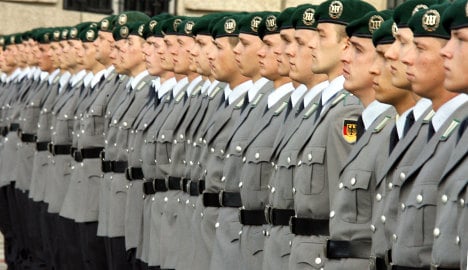I come from a military family and so I can well remember my English father’s withering contempt for the Bundeswehr, its concessions to the individual, its subversive concept of “Citizens in Uniform.”
He was, by the standards of the time, an enlightened man but he was sure of one thing: armies had to be strong, otherwise they had no function and strength meant ignoring dissent. There had to be leadership and a clear chain of command, not democratic consensus.
I was an adolescent, in perpetual conflict with my father, and so delighted in praising the Bundeswehr. “If you want blind loyalty,” I told him, “buy a German shepherd.” He threw a shoe at me.
But many non-German Europeans like me, growing up in the 1960s admired the “Citizens in Uniform” concept because we thought it undermined the army, and we considered all armies to be redundant back then. Of course, I have since changed my mind. And Germany has quietly discarded any pretence of having a democratic military. Defence Minister Karl-Theodor zu Guttenberg promised last week that he would make the new six month military service into an effective training programme, but we all know that conscription is doomed in Germany, just as it has been phased out elsewhere.
And that’s really just fine; it is time for the citizen to take off his uniform, and let a German soldier to be a soldier. But what the country needs now is radical changes in other institutions that are being managed as if they were part of the Prussian military.
For example, hospitals where powerful head doctors are treated like generals that cannot be challenged or contradicted. Academic institutes where professors expect lowly researchers to produce the work for their articles. Or state television channels, where programme directors are regarded as commanders on horseback leading the battle for ratings.
All these institutions are stuffed full of talented people yet the old-fashioned chain of command, the muzzling of criticism, throws much of that creative energy away. Why do German universities come so low down on international league tables? Why is German television so poor compared to foreign competition? Not because there is a shortage of intelligent, gifted people, but rather because of the way such institutions are managed.
Germany needs a cultural revolution, an opening up. Take German football clubs. Players used to be working class boys who, in return for obeying orders, could make themselves wealthy. Now players are more articulate; they are young millionaires with advisers, and they want the management to listen to their views.
Philipp Lahm quickly found out where that leads. FC Bayern Munich will not accept publicly expressed criticism; a soldier is allowed to grumble in the barracks but not confront his superior officer. Why did Lahm make his doubts about the team’s strategy public? Because no-one was listening when he tried to express them privately.
No wonder that the late goalkeeper Robert Enke was afraid to go public about his depression. He had seen what had happened to Sebastian Deisler at Bayern. Edmund Stoiber, the former state premier of Bavaria, once moaned depressed Deisler was “one of the biggest losing deals” the club had ever negotiated. Was Enke scared of being written off as a loss?
It could be that other countries apart from Germany have these problems; the fear that institutional managers have of losing their authority, of accepting criticism without looking weak. But it’s been a long time since I’ve seen a football coach in England, Italy or France behave like Shalke’s Felix Magath.
“He is like one of those crazy colonels in the First World War or the Crimean War who would yell at his soldiers so that they would be more afraid of him than of the enemy,” said an English friend after we had watched one of Magath’s tantrums.
But football is not war. Good, modern management is not based on fear. If your boss rejects intelligent suggestions, if he accuses you of disloyalty for thinking independently, then tell him to buy a German shepherd. You are not in the army.



 Please whitelist us to continue reading.
Please whitelist us to continue reading.
Member comments